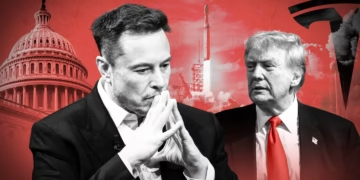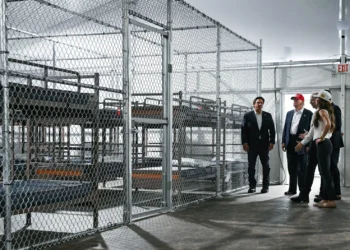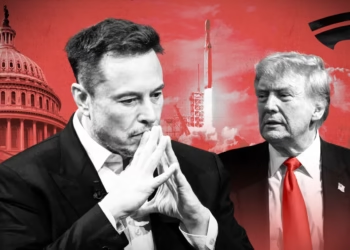The investing world is bracing for change as Warren Buffett steps down, leaving the reins of Berkshire Hathaway to Greg Abel. The Oracle of Omaha’s departure marks the end of an era, but it’s also a new beginning for the conglomerate.
As the new leader, Greg Abel is expected to bring a fresh perspective to Berkshire Hathaway’s investment strategies. With Warren Buffett’s legacy as a guiding force, the company is poised to navigate the challenges of a rapidly changing market.
Key Takeaways
- The transition of leadership from Warren Buffett to Greg Abel marks a significant shift in Berkshire Hathaway’s direction.
- Investors are watching closely to see how Abel’s leadership will impact Berkshire Hathaway stock.
- Warren Buffett’s net worth and legacy continue to influence the company’s investment decisions.
- The future of Berkshire Hathaway under Greg Abel’s leadership is expected to be shaped by evolving market conditions.
- Abel’s fresh perspective is anticipated to bring new opportunities for growth.

The Oracle of Omaha Takes His Final Bow: Buffett’s Retirement Announcement
The investment community was caught off guard when Warren Buffett announced his retirement plans. This significant development marks the end of an era for Berkshire Hathaway, a company that has been under Buffett’s stewardship for decades.
The Shocking News to Shareholders
Warren Buffett’s retirement announcement was met with a mix of shock and curiosity among shareholders. The news sparked a flurry of reactions on financial news platforms and social media, with many investors expressing their sentiments about the future of Berkshire Hathaway.
“I’m surprised, but I have faith in Greg Abel’s ability to lead Berkshire Hathaway,” said one shareholder.
The reaction underscores the confidence many investors have in Greg Abel, Buffett’s chosen successor.
Timeline for Leadership Transition
The transition of leadership is expected to be smooth, with Buffett having already begun the process of handing over responsibilities to Greg Abel. A detailed timeline for the transition has been outlined, ensuring minimal disruption to Berkshire Hathaway’s operations.
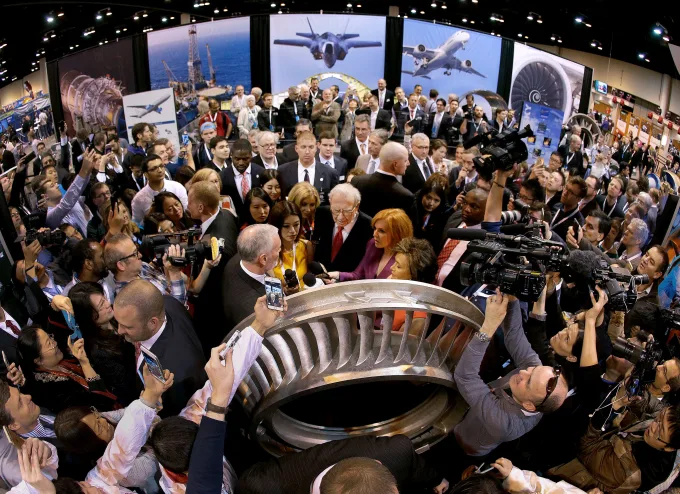
| Transition Phase | Timeline | Key Activities |
|---|---|---|
| Phase 1 | Immediate | Greg Abel takes over as CEO |
| Phase 2 | Short-term | Strategic planning and review |
| Phase 3 | Long-term | Implementation of new strategies |
As the transition unfolds, investors and financial analysts will be closely watching the developments, assessing how Abel’s leadership will impact Berkshire Hathaway’s future performance.
Warren Buffett’s Legendary Journey: Building the Berkshire Empire
From its humble beginnings as a textile company, Berkshire Hathaway has grown into a diversified global powerhouse under Buffett’s guidance. This transformation is a testament to Warren Buffett’s strategic investment decisions and leadership.
From Textile Company to Global Conglomerate
Berkshire Hathaway’s journey began as a textile manufacturing company. However, under Warren Buffett’s stewardship, it evolved into a vast conglomerate with diverse holdings. Buffett’s strategic acquisitions and investments have been pivotal in this transformation.
The company’s portfolio expansion into insurance, retail, and energy sectors has significantly contributed to its growth. Today, Berkshire Hathaway is one of the largest and most successful conglomerates globally, with Warren Buffett’s age and experience being key factors in its success.
| Year | Major Acquisition/Investment | Industry |
|---|---|---|
| 1985 | Capital Cities/ABC | Media |
| 1990 | GEICO | Insurance |
| 2008 | Goldman Sachs | Financial Services |
| 2013 | H.J. Heinz Company | Food Processing |
Investment Philosophy That Changed Wall Street
Warren Buffett’s value investing philosophy has revolutionized the investment landscape on Wall Street. His approach focuses on long-term value creation rather than short-term gains.
Buffett’s strategy involves investing in companies with strong fundamentals and holding them for the long term. This philosophy has not only yielded significant returns for Berkshire Hathaway but has also influenced a generation of investors.
Cultural Impact on American Business
Warren Buffett’s impact extends beyond his investment success; he has also had a profound cultural impact on American business. His annual letters to shareholders are closely watched and have become a significant resource for investors and business leaders.
Buffett’s emphasis on integrity and transparency in business practices has set a high standard for corporate governance. As Berkshire Hathaway transitions to new leadership under Greg Abel, the cultural foundation laid by Buffett will continue to influence the company’s direction.
How Old is Warren Buffett? The Remarkable Life Span of an Investment Icon
As Warren Buffett steps down, it’s worth examining his age and the incredible career that has spanned over six decades. Born on August 30, 1930, Buffett is currently 93 years old, an age considered advanced for someone in such a high-profile and demanding role.
Warren Buffett’s Age and Career Timeline
Buffett’s career in finance began at a young age. He started his first business venture at six, selling chewing gum door-to-door. By 11, he was buying his first stocks, and by 14, he was filing his first tax return. Buffett’s professional career in investments took off in the 1950s, and he took the reins at Berkshire Hathaway in 1965. Over the years, he has transformed the company into the global conglomerate it is today.
Throughout his career, Buffett has been known for his value investing philosophy, a strategy that has contributed to his success. His ability to adapt and evolve with the market has been a key factor in his longevity as a leader in the investment world.
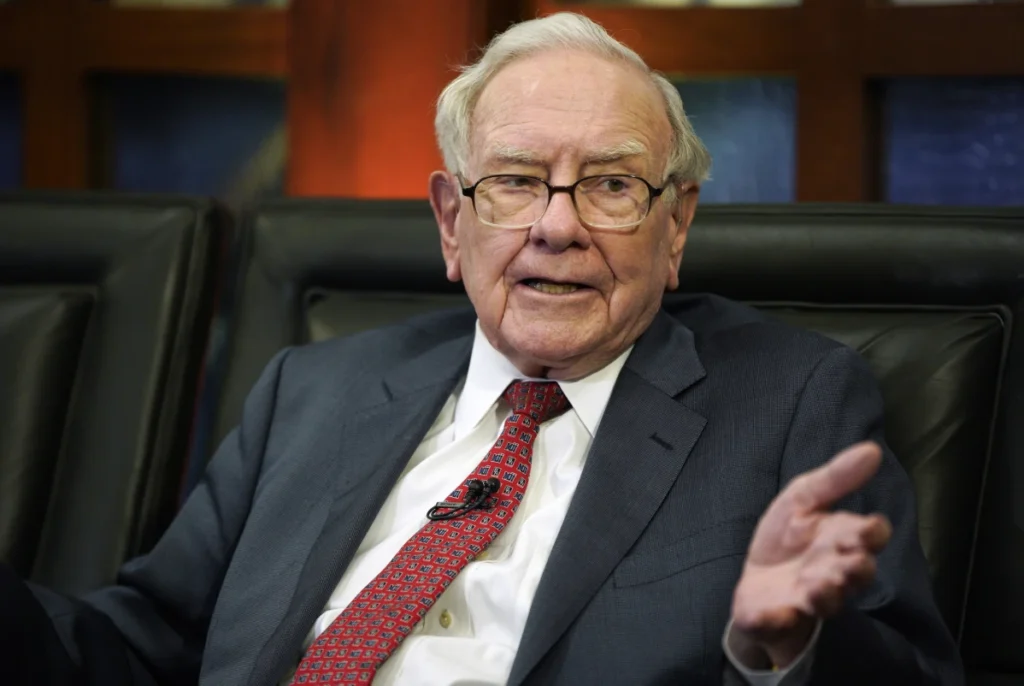
Longevity in Leadership: A Business Anomaly
Buffett’s longevity at the helm of Berkshire Hathaway is nothing short of remarkable. Few CEOs have managed to lead major corporations for as long as Buffett has. His hands-off management style and ability to surround himself with talented individuals have contributed to his extended tenure.
Health Considerations Behind the Retirement Decision
While Buffett has been relatively private about his health, there have been speculations about how his health might have influenced his decision to step down. Although he has not publicly disclosed any serious health issues, the natural process of aging likely played a role in his decision-making. Succession planning has been a hallmark of Buffett’s leadership, and his choice of Greg Abel as his successor indicates careful consideration of Berkshire Hathaway’s future.
Warren Buffett Net Worth2024: The Fortune Behind the Legend
As the baton passes from Warren Buffett to Greg Abel, the question on everyone’s mind is: what’s the current net worth of this investment legend? Warren Buffett’s net worth in 2024 continues to be a subject of immense interest, not just for investors but for anyone fascinated by the world of finance.
Current Financial Standing and Wealth Accumulation
Warren Buffett’s wealth accumulation is a story of decades-long strategic investment decisions and a keen eye for value. As of 2024, his net worth is estimated to be in the hundreds of billions, a testament to his status as one of the most successful investors in history. The bulk of his wealth is tied to Berkshire Hathaway, the conglomerate he has led since 1965.
Key factors contributing to Buffett’s wealth include:
- Successful investments in companies like Coca-Cola, American Express, and Apple.
- Strategic acquisitions made through Berkshire Hathaway.
- Long-term stock market performance.
Philanthropic Commitments and The Giving Pledge
Despite his retirement, Warren Buffett remains committed to philanthropy. He has pledged to give away the majority of his wealth during his lifetime and beyond. The Giving Pledge, a campaign he co-founded with Bill Gates, has been a significant vehicle for his philanthropic efforts, encouraging billionaires worldwide to donate at least half of their wealth to charitable causes.
The Giving Pledge has not only facilitated substantial donations but has also inspired a culture of giving among the world’s wealthiest individuals.

Wealth Distribution Plans Post-Retirement
As Warren Buffett transitions into retirement, speculation about the distribution of his wealth has gained momentum. While the exact plans are not publicly disclosed, it is known that Buffett has already begun donating a significant portion of his fortune. The bulk of his remaining wealth is expected to be channeled into charitable foundations, in line with his commitment to The Giving Pledge.
Potential areas where Buffett’s wealth might make an impact include:
- Education and healthcare initiatives.
- Poverty alleviation programs.
- Global health research and development.
Who Is Gregory Abel? Meet Berkshire Hathaway’s New Captain
Greg Abel, the chosen successor of Warren Buffett, is on the verge of taking over Berkshire Hathaway, bringing his unique leadership style to the forefront. As the company prepares for this significant transition, understanding Abel’s background and management philosophy is crucial.

Professional Background and Rise to Prominence
Gregory Abel has had a distinguished career, marked by his strategic thinking and operational expertise. Before joining Berkshire Hathaway, Abel worked at Pacificorp, a utility company, where he gained valuable experience that would later benefit his role at Berkshire Hathaway Energy.
Abel’s rise to prominence within Berkshire Hathaway was swift, thanks to his impressive performance at Berkshire Hathaway Energy. His ability to navigate complex regulatory environments and drive profitability has been particularly noteworthy.
Leadership Experience at Berkshire Hathaway Energy
As the CEO of Berkshire Hathaway Energy, Abel has demonstrated exceptional leadership skills. He has successfully managed a diverse portfolio of energy assets, including utilities, renewable energy projects, and energy transmission infrastructure.
| Year | Revenue (in billions) | Notable Achievements |
|---|---|---|
| 2018 | $18.3 | Completed acquisition of AltaLink |
| 2019 | $19.2 | Expanded renewable energy portfolio |
| 2020 | $20.1 | Enhanced energy transmission infrastructure |
Personal Life and Management Philosophy
Abel is known for his low-key approach to leadership, preferring to focus on operational excellence rather than seeking the spotlight. His management philosophy emphasizes long-term value creation, sustainability, and integrity.
In conclusion, Greg Abel’s ascension to the top spot at Berkshire Hathaway represents a new chapter for the company. With his rich experience and proven leadership abilities, Abel is well-positioned to steer Berkshire Hathaway into the future.
Greg Abel Net Worth: Financial Profile of Buffett’s Successor
As Warren Buffett steps down, Greg Abel’s financial profile comes under scrutiny, revealing insights into his net worth and compensation structure. With a career spanning decades, Abel has risen through the ranks to become the chosen successor at Berkshire Hathaway.

Current Wealth and Compensation Structure
Greg Abel’s wealth is primarily derived from his role at Berkshire Hathaway, where he has been instrumental in managing the company’s energy sector through Berkshire Hathaway Energy. His compensation package is tied to the performance of the company, reflecting his integral role in the conglomerate’s operations.
The specifics of Abel’s net worth are not publicly disclosed, but it is understood that his compensation is substantial, given his senior position and the scale of the businesses he oversees.
Ownership Stakes in Berkshire Hathaway
While the exact details of Greg Abel’s ownership stakes in Berkshire Hathaway are not widely publicized, it is known that he has been rewarded with significant equity holdings as part of his compensation. This aligns his interests closely with those of the company and its shareholders.
Abel’s stake in Berkshire Hathaway is a testament to Warren Buffett’s confidence in his abilities and his potential to lead the company to continued success.
Comparison to Buffett’s Early Financial Journey
Comparing Greg Abel’s financial journey to Warren Buffett’s early days offers interesting insights. Like Buffett, Abel has demonstrated a keen business acumen and a knack for value creation. However, their paths to success have been different, reflecting the different eras and challenges they faced.
While Buffett began his journey with a focus on investment and acquisitions, Abel has built his reputation through operational excellence, particularly in the energy sector.
Greg Abel, Berkshire Hathaway Stock, Warren Buffet, Warren Buffett Net Worth: The Complete Transition Picture
Berkshire Hathaway’s transition to new leadership under Greg Abel has investors closely watching the company’s stock performance. As the world’s largest conglomerate, Berkshire Hathaway’s shift in leadership is a significant event in the financial world. With Warren Buffett stepping down, the market is keenly observing how Abel will navigate the complexities of managing Berkshire’s diverse portfolio.
Market Response to the Succession Announcement
The market’s initial response to Warren Buffett’s succession plan was largely positive. “Berkshire Hathaway’s succession plan is as well thought out as one could hope for,” said Warren Buffett himself, reflecting the confidence in Greg Abel’s appointment. The announcement led to a stable stock performance, with Berkshire Hathaway’s Class A shares experiencing minimal fluctuation.
Investors and analysts have been closely monitoring the stock’s behavior post-announcement. According to recent data, Berkshire Hathaway’s stock has shown resilience, indicating a vote of confidence in Abel’s leadership capabilities.
Abel’s Potential Impact on Berkshire’s Stock Performance
Greg Abel’s background in managing Berkshire Hathaway Energy and his role in overseeing the company’s non-insurance operations have positioned him well for the top job. His operational expertise is expected to drive efficiency and potentially boost the company’s stock performance. As Abel takes the helm, investors are optimistic about his ability to maintain Berkshire’s strong financials.
Abel’s leadership style, which focuses on long-term value creation, is likely to continue attracting investors. His experience in managing large-scale operations could lead to improved profitability across Berkshire’s subsidiaries.
Investor Confidence in the Post-Buffett Era
Investor confidence remains high as Greg Abel takes over. The transition plan, which includes a gradual handover of responsibilities, has been well-received by the market. Warren Buffett’s net worth, largely tied to Berkshire Hathaway’s performance, is expected to continue growing under Abel’s stewardship.
As the market continues to adjust to the new leadership, investor confidence is likely to be influenced by Abel’s strategic decisions. With a strong track record and a clear vision, Abel is poised to maintain Berkshire Hathaway’s status as a financial powerhouse.
Why Warren Buffett Chose Greg Abel: The Succession Decision Explained
As Warren Buffett passes the torch to Greg Abel, the investment community is keenly interested in understanding the rationale behind this significant succession. The choice of Greg Abel as the next leader of Berkshire Hathaway is a testament to his exceptional leadership qualities and strategic vision.
The Selection Process and Timing
The process of selecting Warren Buffett’s successor has been a long and rigorous one. Berkshire Hathaway’s board has been evaluating internal candidates for several years, with Greg Abel emerging as the top choice due to his impressive track record at Berkshire Hathaway Energy.
According to sources, the selection process involved a thorough assessment of Abel’s leadership skills, strategic thinking, and ability to navigate complex business environments. As noted by a
“Greg Abel has demonstrated a deep understanding of Berkshire’s business model and has shown exceptional leadership capabilities.”
Abel’s Qualifications and Leadership Strengths
Greg Abel’s rise through the ranks of Berkshire Hathaway is attributed to his operational expertise and strategic acumen. His experience in managing Berkshire Hathaway Energy has provided him with a unique understanding of the conglomerate’s diverse businesses.
| Qualification | Description |
|---|---|
| Operational Expertise | Proven track record in managing large-scale operations |
| Strategic Vision | Demonstrated ability to drive long-term growth and profitability |
| Leadership Skills | Strong ability to inspire and motivate teams |
What Buffett Has Said About His Successor
Warren Buffett has publicly praised Greg Abel, highlighting his exceptional leadership qualities and deep understanding of Berkshire Hathaway’s businesses. Buffett’s confidence in Abel’s ability to lead the company into the future is evident in his statements, reassuring shareholders of a smooth transition.
Berkshire Hathaway’s Business Portfolio: What Abel Will Oversee
As Warren Buffett steps down, Greg Abel is set to oversee Berkshire Hathaway’s diverse business portfolio, which spans multiple industries and generates significant revenue. Berkshire Hathaway’s complex structure includes various subsidiaries and investments that have been carefully managed by Buffett over the years.
Key Holdings and Subsidiaries
Berkshire Hathaway’s portfolio is a testament to Buffett’s strategic investment decisions, comprising a wide range of businesses. The company’s key holdings can be categorized into several sectors:
Insurance Operations
Berkshire Hathaway’s insurance segment, led by Geico and General Re, is a significant contributor to the company’s financial performance, providing both auto insurance and reinsurance services.
Energy and Utilities
The energy and utilities sector is another crucial component, with Berkshire Hathaway Energy operating in renewable energy, electricity transmission, and distribution, playing a vital role in the company’s overall revenue.
Manufacturing and Retail
Berkshire Hathaway also has a substantial presence in manufacturing and retail through subsidiaries like Duracell and See’s Candies, showcasing the company’s diversified business interests.
Financial Position at Time of Transition
At the time of the leadership transition, Berkshire Hathaway maintains a robust financial position, with substantial cash reserves and a diverse portfolio of stocks and bonds. The company’s financial health is a testament to Buffett’s prudent management and provides a solid foundation for Abel’s future decisions.
The financial stability of Berkshire Hathaway is expected to play a crucial role in Abel’s ability to navigate future challenges and capitalize on new opportunities.
Challenges and Opportunities Ahead
As Greg Abel takes the reins, he will face both challenges and opportunities in managing Berkshire Hathaway’s complex business portfolio. The company’s diverse holdings and strong financial position provide a solid foundation for future growth, but Abel will need to navigate the evolving market landscape and make strategic decisions to drive continued success.
From Buffett to Abel: Expected Changes in Leadership Style
The transition from Warren Buffett to Greg Abel at Berkshire Hathaway marks a significant shift in leadership, with Abel’s operational expertise set to potentially reshape the conglomerate’s management approach. As the investment world watches closely, there are several key areas where Abel’s leadership style may differ from Buffett’s.
Buffett’s Hands-Off Management Approach
Warren Buffett is known for his hands-off management style, giving subsidiaries a significant amount of autonomy. As Charlie Munger once said, “Warren has a genius for delegating authority to the right people.” This approach has allowed Berkshire Hathaway’s diverse portfolio of companies to operate independently, with Buffett focusing on major investment decisions and capital allocation.
Buffett’s leadership style has been characterized by his ability to attract and retain top talent, allowing him to step back from day-to-day operations. As he mentioned in a
“Berkshire Hathaway’s structure is designed to work without me.”
This structure has enabled the company to maintain stability even as it has grown into a global conglomerate.
Abel’s Operational Focus and Management Style
In contrast, Greg Abel brings an operational focus to his leadership role. Having built Berkshire Hathaway Energy from the ground up, Abel has demonstrated his ability to manage complex operations and drive growth through strategic decision-making. His experience in the energy sector has given him a unique understanding of the importance of operational efficiency and risk management.
Abel’s management style is expected to be more hands-on compared to Buffett, with a focus on driving performance across Berkshire Hathaway’s subsidiaries. As Abel takes the helm, he is likely to leverage his operational expertise to optimize the company’s portfolio and drive long-term value creation.
Potential Evolution in Corporate Culture
As Abel assumes the CEO role, there is potential for an evolution in Berkshire Hathaway’s corporate culture. While Buffett’s legacy will continue to shape the company’s values and investment philosophy, Abel’s operational focus may lead to changes in how the company approaches risk management, talent development, and strategic planning.
The Oracle of Omaha takes his last bow, and it’s clear that it’ll be a new Berkshire Hathaway from here on out. As Abel navigates the challenges and opportunities ahead, his leadership will be crucial in maintaining the company’s position as a global investment leader.
The Future of Berkshire Hathaway’s Investment Strategy Under Abel
The transition of leadership at Berkshire Hathaway from Warren Buffett to Greg Abel raises important questions about the company’s future investment strategy. As Abel takes the reins, the investment community is watching closely to see whether he will continue Buffett’s tried-and-true methods or chart a new course.
Maintaining Buffett’s Core Investment Principles
Abel has emphasized his commitment to Berkshire Hathaway’s core investment principles, which have been the hallmark of Buffett’s success. Value investing and a long-term perspective are likely to remain central to the company’s approach. Abel’s experience working under Buffett and his role in managing Berkshire Hathaway Energy suggest that he understands and respects the foundational strategies that have made Berkshire Hathaway successful.
Potential New Directions for Capital Allocation
While Abel is expected to maintain many of Buffett’s investment principles, there is speculation about potential new directions for capital allocation. Abel may explore opportunities in sectors that were previously underweighted in Berkshire’s portfolio. This could include increased investments in technology or other growth areas that have been gaining prominence.
Technology and Innovation Focus
Berkshire Hathaway’s investment strategy under Abel may also see a greater emphasis on technology and innovation. As the global economy continues to evolve, Abel may look to invest in companies that are at the forefront of technological advancements. This could represent a shift from Berkshire’s traditional focus on more established industries.
As Berkshire Hathaway navigates this leadership transition, the company’s commitment to its core values and investment principles will be crucial. Abel’s ability to balance continuity with innovation will be key to the company’s continued success.
Shareholder and Market Reactions to Berkshire Hathaway’s Leadership Change
The transition of leadership at Berkshire Hathaway from Warren Buffett to Greg Abel has sent ripples through the financial markets. As the news broke, investors and analysts scrambled to assess the potential impact on the conglomerate’s future performance. Berkshire Hathaway’s stock was closely watched, with many investors eager to understand how this change might affect the company’s investment strategy and overall direction.
Institutional Investor Perspectives
Institutional investors have been closely monitoring the transition, with some expressing confidence in Greg Abel’s ability to lead Berkshire Hathaway. Many institutional investors believe that Abel’s operational expertise will be a significant asset in navigating the company’s diverse portfolio of businesses. For instance, Abel’s successful management of Berkshire Hathaway Energy is often cited as evidence of his capabilities.
Retail Shareholder Concerns and Confidence
Retail shareholders, on the other hand, have shown a mix of concern and confidence. While some are worried about the potential for changes in Berkshire Hathaway’s investment philosophy under Abel, others are reassured by Buffett’s endorsement of his successor. A survey of retail investors revealed that many are optimistic about the future, citing Abel’s track record and the stability of Berkshire’s leadership structure.
Analyst Forecasts for the Transition Period
Analysts have provided varying forecasts for Berkshire Hathaway’s stock performance during the transition period. Some predict a short-term dip due to uncertainty, while others expect the company’s strong fundamentals to maintain investor confidence. A recent analysis by a leading financial firm suggests that Berkshire Hathaway’s stock may experience a slight adjustment in the immediate future but is likely to stabilize as Abel’s leadership proves effective.
| Investor Type | Reaction | Key Concerns |
|---|---|---|
| Institutional Investors | Generally positive, citing Abel’s operational expertise | Potential changes in investment strategy |
| Retail Shareholders | Mixed, with some concern and some confidence | Changes in investment philosophy, leadership stability |
| Analysts | Varied forecasts, with some predicting short-term volatility | Berkshire Hathaway’s stock performance, overall market reaction |
In conclusion, the market’s reaction to Warren Buffett’s retirement and Greg Abel’s succession at Berkshire Hathaway has been multifaceted. While there are various perspectives among institutional investors, retail shareholders, and analysts, the overall sentiment appears to be cautiously optimistic. As the transition unfolds, the financial community will continue to watch Berkshire Hathaway’s stock performance and strategic decisions closely.
Conclusion: Berkshire Hathaway’s Next Chapter Begins
As Warren Buffett steps down as CEO of Berkshire Hathaway, the investment world watches with great interest as Greg Abel takes the reins. With a legacy built over decades, Buffett leaves behind a conglomerate with a diverse portfolio and a reputation for prudent financial management.
Berkshire Hathaway’s future under Abel’s leadership is a topic of significant speculation. Abel’s background in energy and his experience as vice chairman for non-insurance operations position him well to navigate the complexities of Berkshire’s vast holdings. Warren Buffett’s net worth, accumulated through shrewd investments and strategic decisions, serves as a testament to the company’s potential for continued success.
The transition is expected to be smooth, given Abel’s familiarity with Berkshire’s operations and his proven leadership abilities. As the future of Berkshire Hathaway unfolds, investors and analysts alike will be monitoring the company’s performance under Abel’s guidance. With a strong foundation established by Buffett, the stage is set for continued growth and innovation.
Greg Abel’s appointment as CEO underscores Berkshire Hathaway’s commitment to maintaining its legacy while embracing new challenges and opportunities. As the company embarks on this new chapter, its diverse portfolio and robust financial position will likely continue to attract investors and drive long-term value creation.
FAQ
Who is Greg Abel?
Greg Abel is the successor to Warren Buffett as the leader of Berkshire Hathaway. He has a strong professional background and has risen to prominence within the company, particularly through his leadership at Berkshire Hathaway Energy.
How old is Warren Buffett?
Warren Buffett is currently in his 90s, having been born on August 30, 1930. His advanced age was a factor in his decision to step down as the leader of Berkshire Hathaway.
What is Warren Buffett’s net worth?
As of 2024, Warren Buffett’s net worth is substantial, accumulated through his successful investment strategies and leadership of Berkshire Hathaway. The exact figure can fluctuate but remains one of the highest in the world.
What will happen to Berkshire Hathaway’s investment strategy under Greg Abel?
While Greg Abel is expected to maintain some of Warren Buffett’s core investment principles, there may be new directions for capital allocation, potentially with a greater focus on technology and innovation.
How has the market reacted to Warren Buffett’s retirement and Greg Abel’s succession?
The market reaction has been varied, with institutional investors and retail shareholders expressing different levels of confidence and concern regarding the leadership change and its implications for Berkshire Hathaway’s future.
What are the key holdings and subsidiaries of Berkshire Hathaway?
Berkshire Hathaway has a diverse portfolio that includes significant holdings in insurance, energy, manufacturing, and retail, among other sectors. The company’s subsidiaries operate across various industries, contributing to its financial strength.
Why did Warren Buffett choose Greg Abel as his successor?
Warren Buffett chose Greg Abel due to his strong leadership qualities, operational expertise, and his proven track record within Berkshire Hathaway, particularly in managing Berkshire Hathaway Energy.
What is Greg Abel’s net worth?
Greg Abel’s net worth is significant, reflecting his successful career and compensation structure within Berkshire Hathaway. While not as high as Warren Buffett’s, it is still substantial and has been built through his work at Berkshire Hathaway.
When is Warren Buffett stepping down from Berkshire Hathaway?
Warren Buffett announced his intention to step down by the end of the year, marking a significant transition in Berkshire Hathaway’s leadership.









